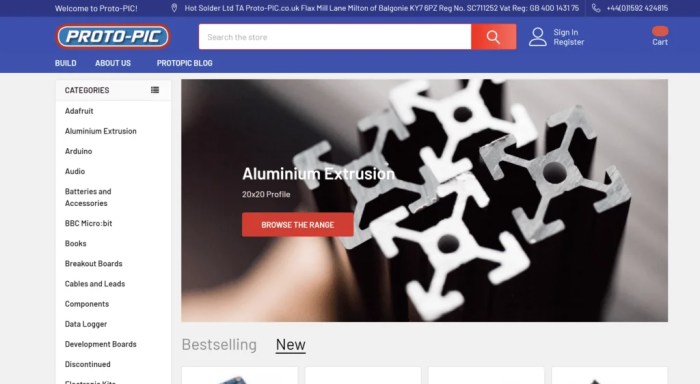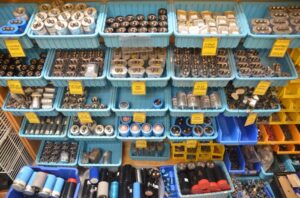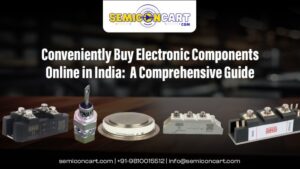Electronic components are the building blocks of modern electronic devices. They come in various forms, each serving a unique function. Whether it's a simple resistor or a complex microcontroller, these components play crucial roles in the overall design and operation of electronic systems. Understanding the types of electronic components available can significantly aid both hobbyists and professionals in making informed decisions for their projects.
Types of Electronic Components
There are numerous electronic components available, but they can generally be categorized into two main types: active and passive components.
- Active Components: These components can amplify signals or generate power. Common examples include transistors, diodes, and integrated circuits (ICs). They are vital in applications like signal processing and data conversion.
- Passive Components: These components do not amplify or generate energy. They include resistors, capacitors, and inductors. Passive components are essential in filtering and controlling signal flow in circuits.
Electronic components are important in a wide range of applications, from consumer electronics like smartphones and computers to industrial machinery and medical devices. Their reliability and efficiency directly impact the technology we use daily.
Locating Electronic Component Suppliers
Finding reliable suppliers for electronic components is crucial for both professionals and enthusiasts. Fortunately, there are various methods to locate these suppliers effectively.
Methods for Finding Local Suppliers, ELECTRONIC COMPONENT SUPPLIERS NEAR ME
Local electronic component suppliers can be located using several strategies.
- Check local business directories: Many cities have directories listing electronic supply businesses.
- Visit electronics markets: These markets often feature multiple vendors, providing various options under one roof.
- Network with local hobbyist groups: Engaging with local makers or electronic enthusiast communities can lead to valuable supplier recommendations.
Online resources also play a significant role in this search. Websites such as electronic component marketplaces and directories can help identify nearby suppliers, often providing user reviews and product availability.
Evaluating Supplier Reliability
Assessing the reliability of electronic component suppliers is essential for ensuring quality and service.
Criteria for Assessing Reliability
When evaluating potential suppliers, consider the following criteria:
- Experience: A supplier with a long history in the industry is often more reliable.
- Customer Reviews: Reviews and ratings from other customers can provide insights into the supplier’s reliability.
- Quality of Products: Ensure that the components meet necessary standards and specifications.
- Customer Support: A supplier that offers good customer service can assist with any issues that may arise.
A checklist can be useful for systematically evaluating suppliers based on these factors, ultimately aiding in making informed choices.
Comparing Supplier Offerings
When considering different suppliers, it's essential to compare their offerings effectively.
Comparing Product Offerings
To make a fair comparison, create a table that organizes critical information about each supplier.
| Supplier | Product Range | Pricing | Delivery Options |
|---|---|---|---|
| Supplier A | Resistors, Capacitors, ICs | $100 | Standard, Express |
| Supplier B | Transistors, Diodes, Sensors | $95 | Standard |
Bulk purchasing often offers advantages such as discounted rates and reduced shipping costs compared to buying individual components.
Understanding Pricing and Costs
Pricing of electronic components can vary significantly based on multiple factors.
Factors Influencing Pricing
Several elements play a role in determining the costs of electronic components:
- Market Demand: High demand for specific components can lead to increased prices.
- Supplier Location: Proximity to the supplier can affect shipping costs and overall pricing.
- Order Size: Bulk orders often receive discounted pricing compared to smaller orders.
Negotiating prices for bulk orders can lead to further cost savings, making it essential to consider these factors when deciding on purchases.
Supplier Customer Service and Support
Customer service is a vital aspect of the electronics supply industry.
Importance of Customer Service
Good customer service can significantly enhance the purchasing experience. Examples of effective customer service include prompt responses to inquiries and assistance with technical issues. In contrast, poor customer service experiences can lead to frustration and loss of trust.
It is crucial to assess a supplier's support for handling technical inquiries, as effective support can lead to smoother project execution.
Trends in Electronic Component Supply Chain: ELECTRONIC COMPONENT SUPPLIERS NEAR ME
The electronic component supply chain is continuously evolving, influenced by various external trends.
Current Trends Affecting Suppliers
Several trends currently shape the landscape of electronic component suppliers:
- Increased demand for sustainable components.
- Supply chain disruptions due to global events, such as pandemics.
- Automation and digitalization in inventory management.
These trends affect availability and pricing, indicating a need for suppliers to adapt to changing conditions.
Building Long-Term Relationships with Suppliers
Establishing strong relationships with electronic component suppliers can lead to mutual benefits.
Strategies for Developing Relationships
To foster long-term partnerships, consider the following strategies:
- Maintain regular communication: Keep in touch with suppliers to stay updated on new products and services.
- Provide feedback: Share your experiences with suppliers to help them improve.
- Engage in loyalty programs: Many suppliers offer benefits for repeat customers, enhancing the value of your purchases.
By developing these relationships, businesses and hobbyists can ensure better service and access to high-quality components over time.
Future of Local Electronic Component Supply
The future of local electronic component supply is poised for significant changes driven by technological advancements.
Predictions for Future Trends
Looking ahead, several trends may influence local suppliers:
- Increased integration of AI in supply chain management.
- Growing focus on local sourcing to reduce shipping times and costs.
- Expansion of online marketplaces catering to local suppliers.
As technology evolves, so too will the dynamics of the supplier landscape, making it essential to stay informed about these changes.




